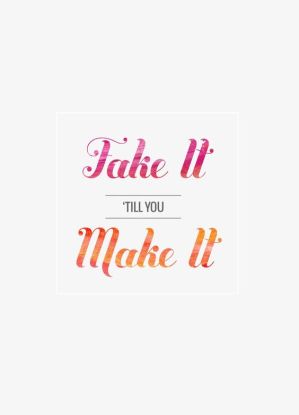Memory as a Social Construct
Q.You talk a lot about memory in your book. Are we augmenting our memories with computers, or are we replacing them?
A.I would say we are augmenting them. When I started the book I was genuinely worried that I was losing my memory to Google, but the more I studied the way that everyday memory works, the more I realized how much we already rely on other outside sources — books, Post-it notes, etc. — but also other people to remember things. We are social thinkers, and we are also social rememberers, we use our co-workers, our partners and our friends to help us retrieve the details about things that they they are better at remembering than we are. And they’ve used us in the same way. Memory has always been social. Now we’re using search engines and computers to augment our memories, too.
The above piece is from an interview with Clive Thompson about his book and how he believes that Google is not dulling our ability to memorize things, and I agree…kind of. He goes onto talk about how social media is used as a tool in establishing connections and creating ambient awareness. While reading just the interview, as well as the other pieces from this week, it honestly started to remind me of the Black Mirror episode, “Be Right Back.”
In the episode a young woman loses her husband unexpectedly and shortly thereafter discovers she is pregnant. While at the funeral, a friend of her’s suggests she try this thing where she can “talk” to “her husband” via a computer program (I think?) that takes all the information he ever shared online and creates his personality from it. I won’t tell you what happens after that, but basically it’s not the same person.
The internet gives us an outlet where we can share and post virtually anything we want. Thompson argues that though most of these are insignificant, they add up over a period of time to help develop memories of people. It has allowed us the opportunity to connect with people who otherwise would’ve been out of our lives months and maybe even years ago. We create these memories or personas of people in our minds based solely off of the content they post online. I won’t go into detail about the “highlight reel” theory but know that it exists and that it does happen.
With being the social creatures we are and the ever developing forms of social interaction that are popping up at an alarming rate, I believe it’s only fair to say that our memories will be shaped more and more by our use of technology. It is up to the user to decide how and when it happens. All I ask is that you continue to have an emotional connection to those memories regardless of the platform that you’re saving them on.
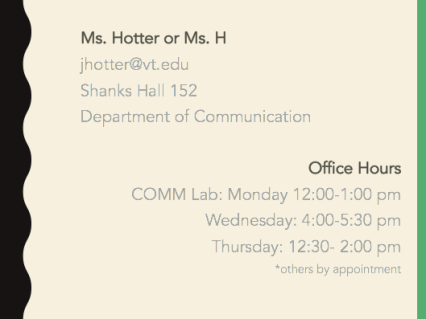 I’ve only taught four classes so far, but I have never received any sort of backlash for my name by my own students. The only time my last name has been commented on was by a colleague’s student that I had substituted for. His comments were addressed quickly and nothing more of it was said by him or any other student.
I’ve only taught four classes so far, but I have never received any sort of backlash for my name by my own students. The only time my last name has been commented on was by a colleague’s student that I had substituted for. His comments were addressed quickly and nothing more of it was said by him or any other student.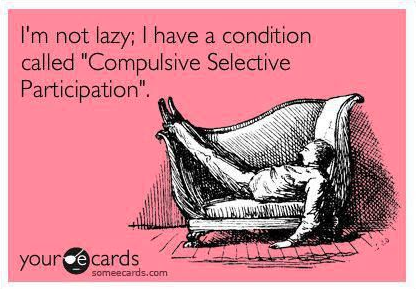 I think it’s important to meet students in the middle. You’ve got to relate to them in some manner just to get the conversation going. Talk about life, love, the pursuit of happiness. Whatever you need to do to get people talking, do it (as long as it’s professional). I open every class by playing music. Sometimes I’ll ask my students if there’s anything in particular they want to listen to and if not I throw on some 90’s Alternative Rock. This gets them at least out of that awkward silence before class and talking with their classmates.
I think it’s important to meet students in the middle. You’ve got to relate to them in some manner just to get the conversation going. Talk about life, love, the pursuit of happiness. Whatever you need to do to get people talking, do it (as long as it’s professional). I open every class by playing music. Sometimes I’ll ask my students if there’s anything in particular they want to listen to and if not I throw on some 90’s Alternative Rock. This gets them at least out of that awkward silence before class and talking with their classmates.
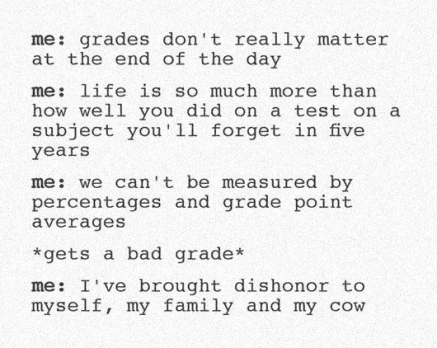
 acknowledge and reflect on experiences, emotions, and thoughts without allowing them to overwhelm or control you. It’s giving positive energy to your thoughts, nurturing them, and allowing them to grow peacefully.
acknowledge and reflect on experiences, emotions, and thoughts without allowing them to overwhelm or control you. It’s giving positive energy to your thoughts, nurturing them, and allowing them to grow peacefully.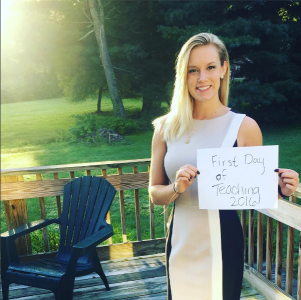 After taking a week long training session, preparing my Powerpoints, and reviewing my rosters, the time had come for me to step into my classroom. I took a deep breath and kept repeating my own little mantra, “fake it till you make it.” I put on 90’s alternative music in hopes of alleviating some of the first day awkwardness. As students trickled in I pretended to be busy, shuffling around papers, refreshing my email every few seconds, and
After taking a week long training session, preparing my Powerpoints, and reviewing my rosters, the time had come for me to step into my classroom. I took a deep breath and kept repeating my own little mantra, “fake it till you make it.” I put on 90’s alternative music in hopes of alleviating some of the first day awkwardness. As students trickled in I pretended to be busy, shuffling around papers, refreshing my email every few seconds, and